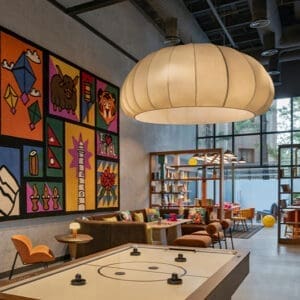 Despite a challenging environment, French hospitality group AccorHotels’ revenue was up 0.9 per cent in 2016. Decreasing tourism traffic in Paris following terror attacks saw a reduction in revenue of 2.8 per cent in France, while currency changes, including the decreased value of the British pound, impacted had a negative impact of 136 million euro, or about $143.5 million.
Despite a challenging environment, French hospitality group AccorHotels’ revenue was up 0.9 per cent in 2016. Decreasing tourism traffic in Paris following terror attacks saw a reduction in revenue of 2.8 per cent in France, while currency changes, including the decreased value of the British pound, impacted had a negative impact of 136 million euro, or about $143.5 million.
AccorHotels has been diversifying its travel business with acquisitions in the hospitality space, looking beyond traditional hotels to vacation rentals and concierge companies.
“AccorHotels has posted an excellent performance for 2016 in a challenging environment, in particular with record levels of EBIT and numbers of hotel rooms opened,” said Se_bastien Bazin, Chairman/CEO of AccorHotels, in a statement.Ê”Thanks to the efforts made by our teams around the world, we have implemented strong operational levers, which enabled growth in earnings to outpace that in revenue.
“We have ventured out to conquer new markets and offer new services thereby consolidating our leadership position and opening up new horizons for our clients.”
Last July, AccorHotels finalized its acquisition of FRHI Hotels & Resorts, owner of the Fairmont, Raffles and Swisstel brands, for $2.7 billion. AccorHotels’ global platform and digital expertise and FRHI’s expertise in operating and marketing luxury hotels suggested mutual benefit.
In 2016, AccorHotels has record development, adding more than 81,000 rooms across 347 hotels, 117 of which were added from Fairmont Raffles Hotel International.
Following its acquisition of FRHI, AccorHotels created a global luxury/upscale division within its organization, putting FRHI executive Chris Cahill at the helm.
During the year, AccorHotels also purchased 100 percent of onefinestay, a purveyor of luxury serviced home rentals, and acquired 79 per cent of concierge service John Paul.
As of February, the group entered exclusive talks with Travel Keys for a private villa rental service.
AccorHotels’ total revenue for 2016 was 5.631 billion, or about $5.9 billion.
Even with the boost from the Olympic Games, Brazil was challenging, declining 2.4 per cent.
Asia Pacific saw franchise development of 252 hotels, helping grow revenue per available room by 4.9 per cent.
Bright spots in Europe included eastern countries, the United Kingdom and Germany.














